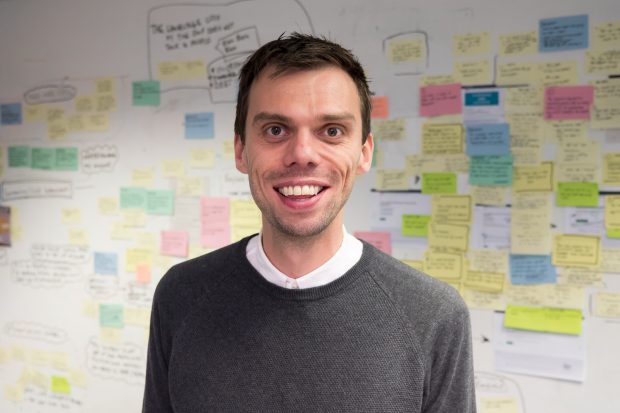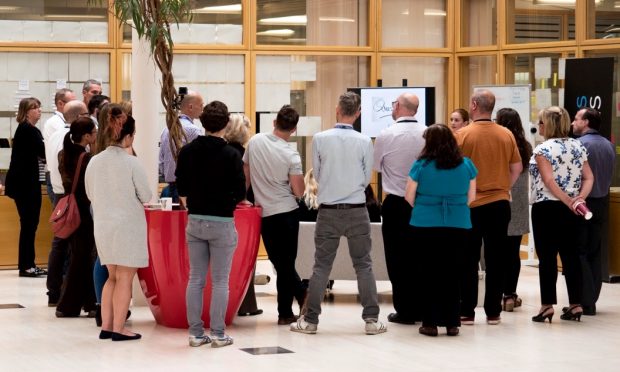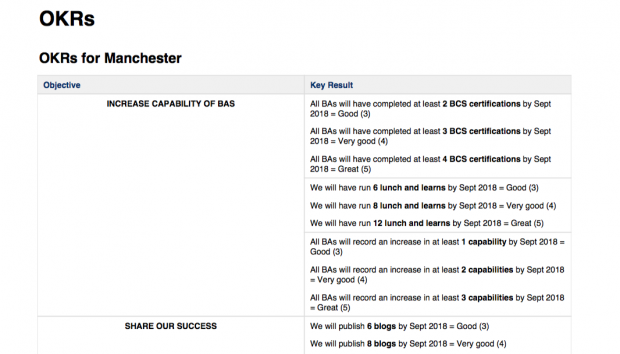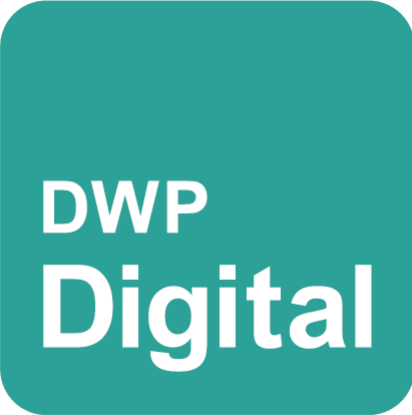Hi, I’m Ryan Thomas Hewitt, Lead Business Analyst at DWP Digital.

I’ve previously written about using a team canvas to identify the needs and aspirations of the Manchester business analyst community.
We want to take those aspirations forward as measurable goals. To do that we are using objectives and key results (sometimes known as OKRs). My colleague Roberto Real introduced me to these and I wanted to share how we’re using them in our team.
Defining objectives and key results
The objective is the high-level ambition or aspiration. The key result is how we measure that objective.
A personal objective and key result might be:
Objective: Increase my understanding of user centered design
Key result:
- attend at least 2 hours of user research every month from September 2017 to August 2018
- attend a user centered design course by September 2018
How we’re using objectives and key results
During the team canvas session we came up with needs and ideas. From these we identified 3 objectives for the Manchester business analyst community:
- Increase the capability of business analysts
- Share our successes
- Have fun!
Quantify the objectives
If we take objective 1 as an example, there are several ways we could increase capability:
- Run external certifications
- Host internal lunch and learns
- Set up a mentoring scheme
What would good look like for each of them?
For this objective, we identified 3 key results. The ambition is to achieve at least “good” in each of them.
Objective 1 - Increase the capability of business analysts in our hub.
Key result - Formal learning
The number of BCS certifications completed by September 2018:
2 = good
3 = very good
4 = great
Key result - Informal learning
The number of lunch and learns run by September 2018:
6 = good
8 = very good
12 = great
Key result - Peer assessments
All business analysts will increase their capabilities by September 2018 by:
1 capability = good
2 capabilities = very good
3 capabilities = great
We held a session with the business analysts to collectively edit and agree the objectives and key results.
By keeping track of OKRs throughout the year we are focussed on achieving these goals and will have lots of successes to celebrate by September 2018.
Tips for creating community objectives and key results
Obviously, this is the first time we’ve tried this, but here are some tips we’ve learnt along the way:
1. Identify the objectives and key results based on what the community wants to achieve
This should be done collaboratively. We had the team canvas to provide an idea of the community purpose and goals.

2. Start with a few objectives
For us there are 3 objectives. We didn’t want to have more than 5.
3. Each objective should have at least one key result
Most of our objectives have several key results.
4. Agree them as a team
Discuss whether they’re the right ones, and whether they’re ambitious enough. These are community goals so should be written with and agreed by the community.
5. Keep track of your progress
We have a Confluence page. We can add notes and pictures about our progress on Confluence (for example the certifications and lunch and learns we’ve run). Every 3 to 4 months I hope to reflect with the team on our progress.
6. Make them ambitious
The idea is that you achieve a score of approximately 70 per cent. This is the theory of setting moonshot goals. If you achieve 100 per cent on everything then you weren’t ambitious enough.
We’re aiming to get a ‘good’ score for all our key results. Any more than that and we’ll be delighted.
7. Make them public
Ours are on Confluence. And in that ethos, a snapshot of some of them is also below:

If you’ve got any questions or would like to know more, let me know.

3 comments
Comment by Alan Rider DfT Digital Capability Lead posted on
Great post Ryan. I love the simplicity of the approach. You should never over engineer these things.
Comment by Imran Hussain posted on
This was a really clear and helpful post Ryan. I am thinking of introducing objectives with some of the communities at Defra, I'd love to talk in more detail on objectives and kick off some collaboration with the Defra Business Analyst Community if you are interested?
You can reach me on Twitter @ImHuYorks or on Cross Gov Slack @ImranH_defra.
Comment by Ryan Hewitt posted on
Thanks for the comment Imran. I'll definitely get in touch with you offline.